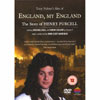England, my England - The Story of Henry Purcell
An imaginative matching of history, ideas, the man and his music
View record and artist detailsRecord and Artist Details
Genre:
DVD
Label: Warner Music Vision
Magazine Review Date: 11/2007
Media Format: Digital Versatile Disc
Media Runtime: 153
Mastering:
Stereo
DDD
Catalogue Number: 2564 69883-2

Author: Jonathan Freeman-Attwood
England, My England appeared on Channel 4 in 1995 at the time of the Purcell tercentenary celebrations and barely made an impression alongside the glut of recordings from the period. That such a generous budget could be spent on a measly old English composer (even if arguably our best) would today be deemed profligate – particularly as Purcell is a figure whose personality is illuminated more by the elusive and nostalgic vein in the music than any sensationalist biographical hook.
Tony Palmer’s film is ambitious about conveying the power of Purcell’s musical language as a means of making sense of life around us. He attempts (and largely succeeds) to combine a life of Purcell within the boiling-pot of 17th-century fin de siècle social and political history. The links between the centuries are sometimes obvious, sometimes abstruse and always perceptive. These sets of tableaux boast some extraordinarily credible, graphic and moving moments which the music enhances to maximum effect, notably the death of Queen Mary – arguably the most adored female royal personage before Princess Diana – and of course the even greater tragedy of Purcell’s death, months later, at the age of 36.
Generally, the film is historically accurate but there are some unnecessary liberties taken (why is “I attempt from love’s sickness” – a late stage song – paraded as juvenilia when documentary evidence is usually quite fastidiously presented?). If the low-point is the otherwise splendid Michael Ball singing “My heart is inditing” to the tune of “O Come ye sons of Art”, the best moments in this film are when the spirit and truth of the age seem uncannily reflected in such noble music. In this sense, despite some rambling, we are educated without knowing it. We can also sense Purcell’s power to “mourn the unknown” for centuries to come.
Tony Palmer’s film is ambitious about conveying the power of Purcell’s musical language as a means of making sense of life around us. He attempts (and largely succeeds) to combine a life of Purcell within the boiling-pot of 17th-century fin de siècle social and political history. The links between the centuries are sometimes obvious, sometimes abstruse and always perceptive. These sets of tableaux boast some extraordinarily credible, graphic and moving moments which the music enhances to maximum effect, notably the death of Queen Mary – arguably the most adored female royal personage before Princess Diana – and of course the even greater tragedy of Purcell’s death, months later, at the age of 36.
Generally, the film is historically accurate but there are some unnecessary liberties taken (why is “I attempt from love’s sickness” – a late stage song – paraded as juvenilia when documentary evidence is usually quite fastidiously presented?). If the low-point is the otherwise splendid Michael Ball singing “My heart is inditing” to the tune of “O Come ye sons of Art”, the best moments in this film are when the spirit and truth of the age seem uncannily reflected in such noble music. In this sense, despite some rambling, we are educated without knowing it. We can also sense Purcell’s power to “mourn the unknown” for centuries to come.
Discover the world's largest classical music catalogue with Presto Music.

Gramophone Digital Club
- Digital Edition
- Digital Archive
- Reviews Database
- Full website access
From £8.75 / month
Subscribe
Gramophone Full Club
- Print Edition
- Digital Edition
- Digital Archive
- Reviews Database
- Full website access
From £11.00 / month
Subscribe
If you are a library, university or other organisation that would be interested in an institutional subscription to Gramophone please click here for further information.




